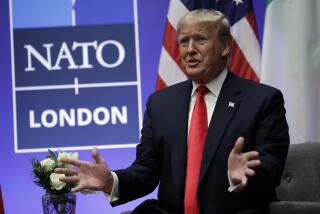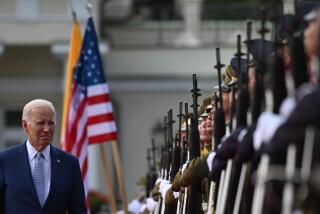Bush Will Try to Reassure Soviets on Germany, NATO
- Share via
KENNEBUNKPORT, Me. — With the future of a unified Germany shaping up as a central issue in next week’s U.S.-Soviet summit, President Bush has indicated that he will try to persuade Soviet President Mikhail S. Gorbachev that there is “no threat to the Soviet Union” if Germany remains a member of the North Atlantic Treaty Alliance.
U.S. officials displayed little alarm at Gorbachev’s remarks Friday suggesting that the Soviet Union might reconsider its participation in conventional arms talks in Europe if a unified Germany becomes a member of NATO.
While Gorbachev’s opposition to German membership in NATO has not shifted, his comments to a Moscow press conference after a meeting with French President Francois Mitterrand were seen by non-government experts in the United States as his most dire warning yet of the consequences of such a step.
Bush, in an interview with French television that was recorded Thursday--one day before Gorbachev made his comments--praised the Soviet president’s handling of the fast-paced changes in Eastern Europe that have brought about the near-disintegration of the Warsaw Pact.
“Gorbachev has handled up until now change in Eastern Europe with great ability. And so I will approach him and make my case for a Germany in NATO,” Bush said, according to a White House transcript made available in Kennebunkport as the President began a four-day Memorial Day holiday at his vacation home. “I have to sell him on the fact that this presents no threat to the Soviet Union.”
After reports of Gorbachev’s remarks in Moscow reached Administration officials, the White House said that it would have no comment until a complete text had been received.
But one Administration official, speaking on condition of anonymity, said Gorbachev’s comments reflected the increasing pressure the Soviet leader apparently is feeling as a result of his plans to pull troops out of Hungary, Poland and Czechoslovakia--all military allies of the Soviet Union until the crumbling of their Communist governments.
The official said the demobilization in Eastern Europe presented Gorbachev with a number of problems, including that of finding housing and work for the returning troops and what he called the “psychological” problem linked to shrinking the Soviet Union’s military role.
In addition, he pointed out that until last week’s meeting in Moscow between Secretary of State James A. Baker III and Soviet Foreign Minister Eduard A. Shevardnadze, the Soviet military had played a conspicuously limited role in recent arms control talks.
That was said to have changed dramatically when Gorbachev sought the advice of a senior general during talks with Baker.
At that meeting, the Administration official said, “the military played an extremely important role.”
Gorbachev’s sharp comments were read not only as a signal that tough bargaining may take place during the Washington summit, but also as a sign that the Soviet president is playing to a home audience of military professionals who are increasingly anxious about their future role.
“Going into the summit, we felt that Germany would be the No. 1 issue,” the Administration official said. “It’s shaping up to be that.”
In Washington, Baker and West German Foreign Minister Hans-Dietrich Genscher reaffirmed Friday their support for German membership in NATO.
Talking to reporters before Gorbachev’s press conference in Moscow, Baker said that he and Genscher achieved “an amazing degree of convergence of views” on German reunification and strategy for the 23-nation Conventional Forces in Europe talks in Vienna.
After talks with Genscher in Geneva, Shevardnadze said Wednesday that the Soviet Union wants to complete the conventional forces talks this year. His optimism seemed to contrast with what the United States and other NATO nations have termed Soviet foot-dragging in the Vienna talks.
Asked to elaborate, Genscher said Shevardnadze expressed a Soviet desire to complete the negotiations quickly but did not provide any hint that Moscow was ready to compromise on artillery, tanks, troop levels and other issues to end the current deadlock.
Baker said he received from Shevardnadze a similar assurance that Moscow wants to reach agreement soon in the Vienna talks.
In the French television interview, Bush recognized the enhanced role of the Soviet military in the negotiations.
Asked whether he thought Gorbachev was being blocked by the military, Bush replied: “I don’t think we know that, but that’s certainly a concern. . . .
“But it’s not my role to figure out whether Gorbachev is having a problem with his right or his left; it’s mine to deal with what’s on the table. And what’s on the table is a strong Soviet leader, clearly in charge, with whom we have a lot of business items.”
Times staff writer Norman Kempster, in Washington, contributed to this story.
More to Read
Get the L.A. Times Politics newsletter
Deeply reported insights into legislation, politics and policy from Sacramento, Washington and beyond. In your inbox twice per week.
You may occasionally receive promotional content from the Los Angeles Times.










